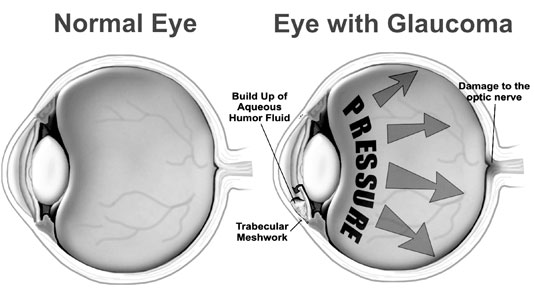|

Glaucoma :
Check early to save your sight
by Nilma DOLE
If you ever find yourself losing your sight gradually, take heed and
notice the warning signs instead of ignoring it.
“Always check with an ophthalmologist if you have any problem with
your eyes because it is important to detect sight loss early instead of
keeping it till the last minute” said the President of the College of
Ophthalmologists Dr.Dharma Irugalbandara.
 |
|
Dr. Dharma
Irugalbandara |
She said that glaucoma is a disease where the optic nerve is damaged,
leading to a gradual and irreversible loss of vision which is often, but
not always, associated with increased pressure of the fluid in the eye.
“Glaucoma occurs when the aqueous solution in the eye builds eye
pressure and this condition affects the optic nerves” said Dr.
Irugalbandara. Usually, this aqueous solution is drained from the eye
internally in a proper method but due to the inability for the eye to
drain this solution properly, the optic nerves become damaged little by
little eventually causing glaucoma.
“The two conditions of glaucoma is acute angle closure and open angle
glaucoma,” said the doctor. “Closed angle glaucoma can affect suddenly
and is often painful loss of vision leading the patient to channel an
eye doctor immediately before permanent damage occurs. Open angle,
chronic glaucoma tends to progress more slowly and the patient may not
notice that he or she has lost vision until the disease has progressed
significantly,” said Dr. Irugalbandara.
“The age group for common glaucoma patients is 40 to 60 years and so
we ask anyone above 40 to get an ophthalmologist to check their eyes,”
said the doctor.
While using reading glasses, if they feel any vision problems coming
on, they should immediately check it without waiting for the last minute
until they lose their vision.
Sometimes, glaucoma can be hereditary and those who have family
members stricken with glaucoma should get their eyes checked.
 “There is no evidence to say that you can get it if it runs in the
family but it’s always better to check early to avoid complications in
the future,” said Dr. Irugalbandara. “There is no evidence to say that you can get it if it runs in the
family but it’s always better to check early to avoid complications in
the future,” said Dr. Irugalbandara.
Glaucoma can be inherited, so immediate family members of a patient
with glaucoma must get their eyes checked.
Dr. Irugalbandara also said there can be children affected by
glaucoma but they can be detected early in a child where treatment can
be given promptly.
There are rarely any symptoms in the early stages of chronic open
angle glaucoma, so regular eye checks by qualified professionals are
important.
Ophthalmologists and optometrists will diagnose glaucoma on the basis
of intraocular pressure, visual field tests and optic nerve head
appearance.
“Patients will sometimes notice patchy loss of peripheral vision.
They can develop photophobia which is they are uncomfortable when they
see bright light, they may tear and they can develop corneal opactity
where the cornea becomes white,” said the doctor.
Symptoms of angle closure glaucoma includes pain in or around the eye
ball, redness, headache, nausea or vomiting and visual disturbances, for
example halos around lights. In some cases there are no symptoms.
 |
|
The vision of a
glaucoma patient |
Dr. Irugalbandara said, “The important advice I can give anyone
diagnosed to have glaucoma is to continue the medication given by the
doctor.”
She added, “The life-long medication thereafter only preserves the
optic nerves but doesn’t improve the vision. Often patients stop using
the medication if they don’t see a vision improvement but they must
understand the aim of treatment, to preserve the nerves and maintain
whatever vision they have “The disease is common among the elderly, it
is always advisable to check your eyes with an ophthalmologist,” said
the doctor.
Other factors can cause glaucoma, known as “secondary glaucomas,”
including prolonged use of steroids, conditions that severely restrict
blood flow to the eye such as severe diabetic retinopathy and central
retinal vein occlusion, ocular trauma and uveitis.
********
A cure for glaucoma?
Italian researchers have revealed that a new medicated eye drop could
possibly cure the symptoms of glaucoma. Glaucoma is the build up of
pressure, called intraocular pressure - inside the eye which causes
damage to the optic nerve cells. In this article from the BBC website,
the findings discuss this newly developed eye-drop and its potential.
“The study of rats and human patients found drops containing a nerve
growth factor may stop these cells dying, and actually improve vision.
It is reported in Proceedings of the National Academy of Sciences
that an estimated 77m people have glaucoma around the world. The build
up of intraocular pressure can sometimes be controlled through other
techniques. But once pressure has started to damage optic nerve cells,
called retinal ganglion cells (RGCs), it has proved impossible to
recover that lost function.
And often people with glaucoma do not seek expert help until the
condition is already relatively advanced.
The researchers, from the University of Rome, treated rats with
symptoms of glaucoma with eye drops containing nerve growth factor.
The animals who were given the eye drops showed decreased levels of
RGC death compared with those who did not receive the treatment.
The researchers went on to test the drops in three human patients
whose intraocular pressure had started to be controlled, but who still
showed signs of progressive deterioration in their vision. In two of the
patients vision improved, while in the other it was stabilised.
The improvements lasted up to 18 months after the eye drops were
applied.
Nerve growth factor appears to trigger chemical changes within cells
that prevent them from dying in response to damage. It might also enable
cells whose function had begun to be damaged to bounce back.
And it might boost the capacity of healthy RGCs to form new
connections within the optic nerve, to compensate for any damage that
had already taken place.
However, nerve growth factor cannot rescue RGCs that have already
died -in common with brain tissue, the optic nerve cannot regenerate.
Lead researcher Dr. Stefano Bonini said: “Although neuroprotection in
glaucoma has already been attempted with several compounds, this is the
first time that an improvement in visual function is observed in
patients with advanced optic nerve damage.”
David Wright, chief executive of the International Glaucoma
Association, warned against drawing firm conclusions from such a small
study - but said the results were encouraging.
He said: “There have been many false dawns in the search for neuro-protective
agents for the treatment of glaucoma and it is a feature of research on
other compounds that early promise does not always translate into
clinical effectiveness when larger studies are undertaken.”
Menopause and mood
Menopause affects mood and this underlines the effect of the loss of
hormones, especially in women.
Menopause can cause irritability, depression and mood. It is now
known that hormones must be replaced and it is much preferable that
hormones be replaced with a bioidentical hormone replacement therapy
because they are safer than synthetic hormones.
Bioidentical hormones will remove the worst symptoms of menopause
including hot flashes, sleep problems and mood issues. Bioidentical
hormones can be prescribed by doctors who have special training in
monitoring hormone levels at menopause.
According to a BBC story headlined: Woman’s death blamed on
menopause, a woman who refused to take hormone replacement therapy (HRT)
died while suffering from a menopausal episode, an inquest has heard.
Margaret Drew from Hayle in Cornwall was killed when she walked out
of her family home on to nearby railway line and was hit by a train.
The Truro inquest was told the 55-year-old had no history of
depression or suicidal behaviour. Cornwall Coroner Dr Emma Carlyon
recorded an open verdict. The former secretary’s husband, Clifford Drew,
said his wife had suffered from menopausal problems, including hot
flushes and mood swings, for about five years. Drew said 99% of the time
she was an “absolutely delightful, lovely and friendly lady”, but she
would become depressed and angry during the mood swings, sometimes for a
few days.
“When my wife was in one of those bad moods she was totally
irrational and the only way to get over it was to give each other
space,” he said.
He suggested his wife try HRT or homeopathic remedies, but she
refused to have any treatment. Mr Drew told the inquest when he returned
from shopping on Friday July 3, his wife was “clearly angry about
something”. He went into another room and, unknown to him, his wife left
their home and wandered on to the railway tracks opposite Chapel Lane.
Train driver Stuart Bilby told the inquest Mrs Drew was about 50ft in
front of him when he saw her on the tracks. She was looking down and
walking along the sleepers, he said. ‘Nature’s way’ Mr Bilby said when
he sounded the horn and applied the engine brake, Mrs Drew appeared
“startled” and seemed to step out of the way. “I then heard a heavy,
dull thud and I knew I had hit her,” he said.
The court heard Mrs Drew’s GP was unable to shed any light on her
death as she had never attended surgery.
Mr Drew, a retired railway station manager, said he and his wife had
discussed suicides on several occasions, because he had come across many
instances in his long career.
“She always expressed the view that it was a selfish thing to do,” he
said.
Recording an open verdict, Dr Carlyon said: “There’s often no reason
for the menopause, it’s just the way nature doles it out really.” The
coroner said although it was “strange” Mrs Drew was on the railway line,
the facts did not point to anything in particular.
“There is no trigger to this at all, except the hormones making her
do things that she normally wouldn’t do,” Dr Carlyon said.
Calcium supplements may raise risk of heart attack
“Calcium supplements, which many people consume hoping to ward off
osteoporosis, may increase the risk of heart attack by as much as 30
percent, researchers reported.
These tiny tablets which carry concentrated doses of calcium were
also associated with higher incidences of stroke and death, but they
were not statistically significant.
 The researchers advised people consuming calcium supplements to seek
advice from their doctors, take more calcium-rich foods and try other
interventions like exercise, not smoking and keeping a healthy weight to
prevent osteoporosis. The researchers advised people consuming calcium supplements to seek
advice from their doctors, take more calcium-rich foods and try other
interventions like exercise, not smoking and keeping a healthy weight to
prevent osteoporosis.
“People regard calcium supplements as natural but they are really not
natural at all,” Ian Reid, professor of medicine at the University of
Auckland in New Zealand, said in a telephone interview.
Reid and colleagues in Britain and the United States conducted a
meta-analysis encompassing 11 studies that tracked nearly 12,000 elderly
people over four years.
Half of them were given calcium supplements and the other half
placebo or dummy pills with no therapeutic content. The results were
published in the British Medical Journal.
“What we found was a 30 percent increase in heart attacks in the
people who were randomised to take calcium,” Reid said.
“If you have 1,000 people taking calcium for five years, we will
expect to find 14 more heart attacks, 10 more strokes and 13 more deaths
in the people given calcium than they would have had if they hadn’t been
treated with calcium,” Reid said.
“That is 37 more adverse events and we expect 26 fractures being
prevented. So calcium is associated with more bad things happening than
with bad things prevented.”
While experts are not certain about the biological mechanism by which
calcium supplements may damage the body, studies in the past have linked
high levels of blood calcium to more heart attacks and damage to blood
vessels, Reid said.
“When you take calcium supplements, your blood calcium level goes up
over the following four to six hours and goes up to the top end of the
normal range,” he said.
“That doesn’t happen when you have calcium to eat in your diet
because the calcium from food is very slowly absorbed and so the blood
calcium level hardly changes at all.” Higher blood calcium may lead to
the formation of plaques in blood vessels, which can lead to heart
attack, stroke and other cardiovascular diseases, Reid said.
“People have always focused on fat levels in the blood as driving
that process (plaque formation) but there is increasing evidence now
that calcium levels in the blood might drive that as well,” he added.”
-Reuters
Medi-tips:
Two cups of water can help you fight the bulge
Washington: There’s an elixir that needs no prescription, has no
side-effects and almost comes for free. Just two cups of water taken
before meals can help you win the battle of the bulge, a new clinical
trial has confirmed.
Researchers at the 240th National Meeting of the American Chemical
Society (ACS) presented these results.
 “We are presenting results of the first randomised controlled
intervention trial demonstrating that increased water consumption is an
effective weight loss strategy,” said Brenda Davy, senior study author,
Virginia Tech Institute, US. “We are presenting results of the first randomised controlled
intervention trial demonstrating that increased water consumption is an
effective weight loss strategy,” said Brenda Davy, senior study author,
Virginia Tech Institute, US.
“We found that over a course of 12 weeks, dieters who drank water
before meals three times a day, lost about five pounds more than dieters
who did not increase their water intake,” she said.
“People should drink more water and less sugary, high-calorie drinks.
It’s a simple way to facilitate weight management,” Davy added,
according to a Virginia Tech statement.
Davy pointed out that experiment and everyday experience has long
suggested that water can help promote weight loss.
But surprisingly, there has been little scientific information on the
topic. Previous studies hinted that drinking water before meals reduces
intake of calories. The study included 48 adults aged 55-75 years,
divided into two groups.
One group drank two cups of water prior to their meals and the other
did not. All of the subjects ate a low-calorie diet during the study.
Over 12 weeks, water drinkers lost about 15.5 pounds while the non-water
drinkers lost about 11 pounds.
Davy said water may be effective simply because it fills up the
stomach with a substance that has zero calories. People feel fuller as a
result and eat less calorie-containing food during the meal. “Increased
water consumption may also help people lose weight if they drink it in
place of sweetened calorie-containing beverages,” Davy said.
(IANS)
How HIV travelled around the world
With regard to how the disease of HIV travelled around the world it
has been said that the disease spread around the world by way of the
happy-go-lucky vacationer. I guess people are really carefree when on
vacation.
“HIV’s spread around Europe mapped Scientists who have mapped HIV’s
spread across Europe say holidaymakers infected abroad are largely to
blame.
By analysing samples from 17 European countries, the international
team tracked the movement of the virus around the continent.
Their map shows Greece, Portugal, Serbia and Spain are big HIV
exporters, with many tourists to and migrants from these countries
leaving with the virus. The UK is an exporter and importer,
Retrovirology journal says. The same is true of Israel, Norway, the
Netherlands, Sweden and Switzerland, while countries such as Austria,
Belgium, Denmark, Germany and Luxembourg are largely importers of HIV,
the researchers say.
In Poland, HIV is contained but is spread among its inhabitants
because of injecting drug-users, the research group found. To construct
their map, the researchers looked at the most common type of HIV
circulating in Europe, known as HIV-1 subtype B. They tracked its
migration by creating a family tree for the virus, looking at detailed
genetic characteristics that reveal how the virus has been evolving over
time.
Lead author Dimitrios Paraskevis, of the University of Athens said:
“Popular tourist destinations Greece, Portugal and Spain probably spread
HIV with tourists infected during their holidays.” In the case of Serbia
as an exporter, it is most likely down to its inhabitants travelling to
other countries and carrying the virus with them, he said.
“To a large extent HIV spread within Poland is due to injecting
drug-users, who make up around half of the HIV-infected population.
“Viruses move around with travellers - thus health programs within
countries should not only target the national populations, prevention
efforts must also be aimed at migrants, travellers and tourists - who
are both major sources and targets of HIV.”
Rowan Harvey, of the Terrence Higgins Trust, said: “HIV isn’t
constrained by borders, it’s a global epidemic and there are bound to be
patterns of transmission between countries. “Tourists travelling abroad
should definitely pack condoms, but people should also be aware that HIV
is at its highest level in the UK as well.
“To protect yourself from HIV and other sexually transmitted
infections, safer sex is essential both at home and abroad.””
- BBC News
|

